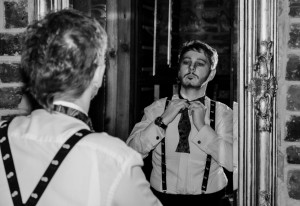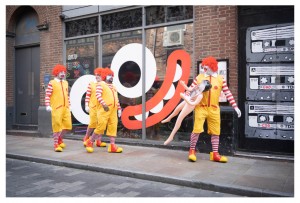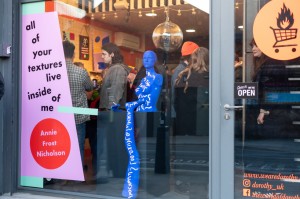Lakwena Maciver’s A green and pleasant land (HA-HA) – Reviewed
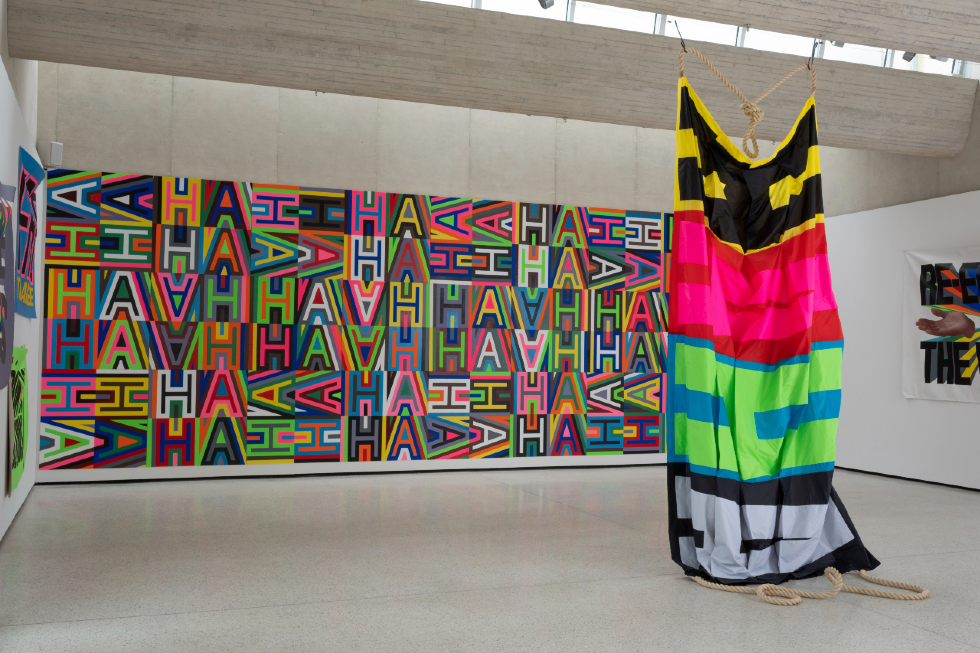
Who’s laughing at who? Hannah Hutchings-Georgiou finds poetry, beauty and manifold meanings in Yorkshire Sculpture Park’s new exhibition…
The taxi turns into the expansive grounds of Yorkshire Sculpture Park (YSP) and my eye catches a flash of fluorescent pink, green and red. It won’t be the first time today that colour gleams in trees, lights up lawns and illuminates the misty autumnal landscape, but this strip of polychromatic fabric snags my curiosity like no other. Suspended between two branches and draped on the leaf-strewn grass is a large rectangular swath of cloth printed with the phrase, “HA HA”, in bold, eye-grabbing colours and type. Turning around in the backseat of the cab to steal another look, I can’t help but laugh, as per the instruction of the cloth, and much to the consternation of the driver. Giggling, I realise there are two jokes here, two signs, two potential punchlines that are, despite the provocation of the phrase, no laughing matter.
‘Cover your mouth (HA-HA)’ is the first artwork of Lakwena Maciver’s extremely clever and thought-provoking show, A green and pleasant land (HA-HA). Though most of the exhibition is shown in a beautifully lit and intimate Weston Gallery, this piece, like the precious PPE worn during the thick of the pandemic, is discarded and exposed to the elements in the surrounding park. Outrageously witty and wonderfully irreverent, ‘Cover your mouth (HA-HA)’ contains an arsenal of symbolism and socio-political significance. Made to resemble a Covid-19 face-mask, the artwork also looks to the ha-ha, a boundary or sunken fence/ditch designed to contain cattle and create the illusion of an uninterrupted stretch of land. Erected on landed property during the Enclosure Acts of the long eighteenth century, ha-has have come to signify the gradual partitioning and narrowing of lands, communities, bodies and ideas. That Maciver’s sculpture is positioned directly opposite one of the park’s original ha-has is no coincidence. Pointing out the hidden spatial and social boundaries, and emblazoned with the punning phrase, Maciver’s striking sculpture initiates an important conversation about access, repression, freedom of movement and speech, and forces us to consider the difference between the protection and policing of bodies, spaces and words (reverse the “Ha ha” to “ah ha” and laughter turns to thought).
Inside, invisible barriers are made startling visible again in a wall-to-wall painting of the same repeated homophonic noun. In kaleidoscopic patterns and mesmeric combinations, the phrase is manically replicated to the point of absurdity. This is, however, exactly Maciver’s point; turning the word on its head, she debunks and dismantles the exclusionary and repressive forces the ha-ha symbolises. A riot of colour rocks and mocks conventions and privations of the past, ushering in the freedom of laughter, the liberty – and liberality – of humorous and joyous feelings. But as if to further complicate the meanings and feelings implicit in the ha-ha, Maciver has an audio of laughter (made up of recordings of volunteer locals from the West Yorkshire area and those around the UK) playing throughout the space. Like Maciver’s word play and carnivalesque use of colour, actual laughter not only breaks bounds, but traverses and transforms them, and the spaces and bodies they strive to dictate. There is a subtle, but fantastically audible message here: so much in our world may be contained and divided, but laughter – or rather that which makes us connect as humans – cannot be suppressed. Quite the opposite; jokes and the laughter they elicit often unite.
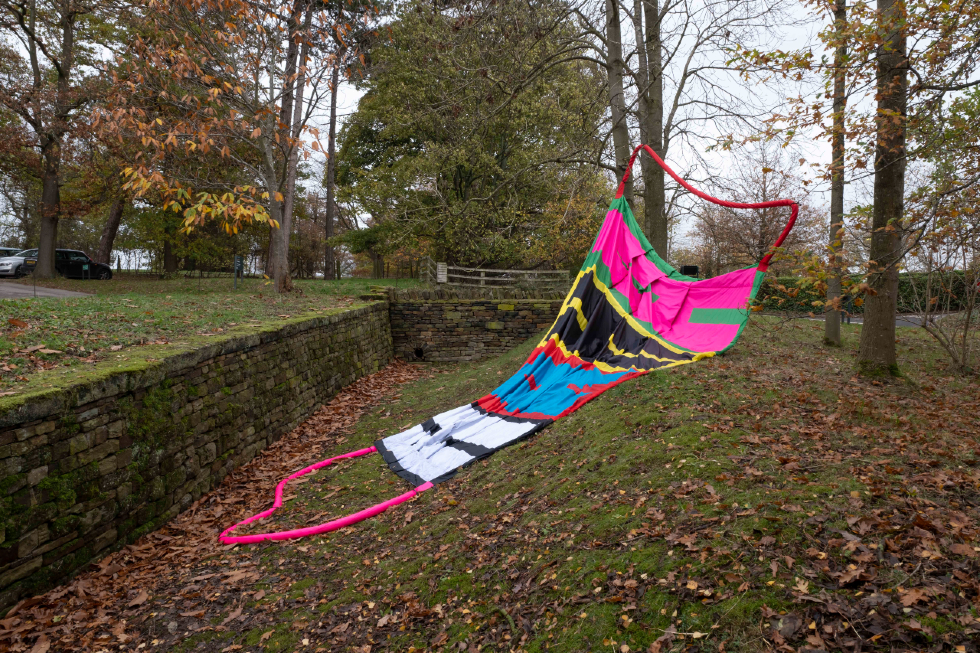
Then again, we know that jokes, like barriers, can be cruel. Laughter may be healing; it may bridge cultural and social divides, but that depends on who’s laughing at who – and why. In the audio this is captured when chortles and guffaws give way to sounds that are sinisterly similar to cries and screams. Who has the last laugh and at whose expense are questions that Maciver posits here, as another gigantic face-mask hangs from what appears to be a hangman’s noose in the centre of the room. Towering threateningly over us, with the dizzying op-art tapestry of ‘ha-ha’ patterning the furthermost wall, one starts to feel the pressure of social ridicule, disdain, judgment: a joke gone sour, perhaps fatally so. Like geopolitical and social boundaries, laughter – and the onomatopoeic word that represents it – here becomes weaponised. A laugh becomes a taunt, a threat, a joke that has got totally out-of-hand (and out of bounds).
Standing in front of the face-mask, I cannot help but feel that Maciver is probing more than freedom of speech and the many manipulations and regulations placed around it on- and offline. Gesturing to the joint self-righteousness of mask wearers and mask (or Covid-19) deniers, Maciver turns a side glance at the law and policy-makers during the pandemic; our politicians who said one thing, but did another; who erected other kinds of ha-has during lockdown but laughed at the public when self-confessedly transgressing the barriers themselves. Surrounded by more finely and vibrantly painted slogan paintings (the catchphrases and soundbites of the left and right respectively), the giant mockery of a facemask demonstrates that, indeed, this ‘green and pleasant land’ has become a laughing stock. As it seeks to tighten borders and endanger migrating and asylum-seeking bodies in the process, this ‘green and pleasant land’ is no Jerusalem, but a joke of the cruellest kind.
Yet, Maciver does not rest easy in this pessimism. Hers is a practice and an aesthetic grasping for the poetry, beauty and progress of futurity. Look closely at the gesturing hands in her protest paintings – so skilfully and exquisitely crafted; look closely at the rebounding depth and shades of colour in her word art, and the manifold meanings found in imperatives like ‘RE-EDUCATE THE WORLD’ or ‘DO BETTER’, and tears turn to laughter turn to contemplative thought again. Sounding the call for change, optimism and kindness; for the borders of our world to open while that which has kept them closed – judgment and prejudice – be suspended, Maciver’s exhibition encourages and inspires us not only to “do better”, but be better, think better, live better, and above all give better in this our still far from green and often unpleasant land.
Hannah Hutchings-Georgiou
See Lakwena Maciver: A green and pleasant land (HA-HA) at Yorkshire Sculpture Park, West Bretton, Wakefield until Sunday 19 March 2023
The Weston Gallery is open Tuesday–Sunday and bank holidays, 10.00–16.00, and is free to enter – no tickets required
Image credits from top: Lakwena Maciver, A green and pleasant land (HA-HA), installation view at Yorkshire Sculpture Park, 2022. Courtesy the artist and Vigo Gallery, London. Photo © Jonty Wilde, courtesy Yorkshire Sculpture Park
Lakwena Maciver, Cover your mouth (HA-HA), 2022. Courtesy the artist and Vigo Gallery, London. Photo © Jonty Wilde, courtesy Yorkshire Sculpture Park



